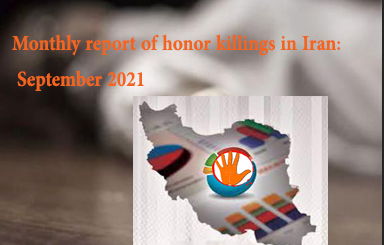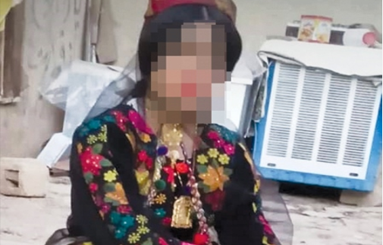Ghesas[1](Retaliation) a Premeditated Murder and a Reactionary Law that Does not Meet the Needs of Today’s Humanity
Rezvan Moghaddam
On June 8th, 2021, the burnt body of Galaleh Sheikhi was discovered on the Sanandaj-Saqez road by the Galaleh family and the city’s intelligence agents after fourteen days of her missing. How these fourteen days passed for Golaleh’s family and friends may not be described. The killer was none other than Kiomars Zarghami, the fiancée of Golaleh Sheikhi, who had last invited Golaleh to the dinner of death. (The Last Supper)
Kiomars tried to flee Iran, but failed. After he was arrested, he confessed to the Saqez Intelligence Office that his main motive for killing his fiancé was his disapproval with Golaleh’s job as a lawyer and he got into an argument with Golaleh. Then set her half-dead body on fire.
Golaleh was a law graduate and legal advisor to the judiciary, a job that many young people dream of. So why did Kiomars oppose Galaleh working as a lawyer? The answer is clear, men like Kiomars, as soon as they marry a woman, consider themselves her owner. Of course, the Shari’a law gives them the same right. Kiomars had assumed that Galaleh would have male clients as a lawyer. Because such men define women in the family as “honor”, they cannot accept that a woman has the right to choose the job of her choice. Therefore, Golaleh’s fiancé considered this as his right to not allow Galaleh to practice. So, he saw forcing her to leave her job, the only way to protect his honor. Because he was faced with Golaleh’s resistance, he easily killed her without a second thought.
“Honor killings” refers to premeditated murders by one or more male family members with a deliberate decision. “Honor” is rooted in the sense of ownership that some men often have over women and control over their bodies and souls. Some people think that honor killing is only a matter of a woman having a relationship with a man, such as falling in love or having an extramarital affair. But honor killing involves any controlling behavior that leads to murder. Such as the right to choose a job, apply for a divorce, leave home without the permission of family men including spouse, father, brother and even uncle. It can be said that “honor” as a social construct; it incorporates a culture of patriarchy and ownership of female into the social fabric and has the potential to lead to immediate behavior from violence to murder.
Many honor killings remain shrouded in mystery. Especially when the killer is “Vali Dam”[2]. In a case like Golaleh’s murder, the family pursues and wants to “bring the killer to justice”. After seven months, the court ruling is finally issued and broadcast on social media. Golaleh’s family declares their readiness to accept the court ruling. Now, by examining the court ruling, it must be seen whether justice is really served?
The court ruling shows that Zarghami has been sentenced to Ghesas (Retaliation) for the murder of Galaleh, on the condition that before executing the sentence, Golaleh’s parents must first pay half of the full blood money[3] to the killer in order for the retribution sentence to be carried out.
It needs to be clarified that the sentence of Ghesas (Retaliation) is promoting extreme violence, reproducing and adding another killer to the killer statistic. Ghesas (Retaliation)does not prevent the recurrence of the crime, nor is it educational in any way. But since there is no alternative to Ghesas (Retaliation) in Islamic law, it puts families at the crossroads of retribution or forgiveness, which means, the law of all or nothing. Obviously, a family that has lost their dear one, cannot tolerate the release of their child’s killer without any punishment who will be walking in front of them free and making fun of them.
For this reason, the victim’s family throws themselves into water and fire to provide half of the ransom blood money. In the meantime, what psychological and financial pressure are imposed on the members of the victim’s family, who have both lost their loved ones and are forced to give monetary gift to the killer in order to be punished? This means double oppression of the victim’s family, once by the killer and once again by the law. They must both be under financial pressure and the family of the victim must be comforted forever because of their presence at the execution scene and their participation in the Ghesas (Retaliation).
But the story of discriminatory laws against women and insults to women does not end there. Now let’s turn to another part of this verdict, issued on January 6th, 2022, to make it a little clearer to everyone how discriminatory laws against women do not stop even after a women’s death.
We read the following part of the sentence: “Regarding the accusation, the accused person for committing a crime against the corpse by burning the body of the victim (Golaleh Sheikhi) is sentenced to pay a 0.17% of the full blood money for the complete hair loss of the scalp and eyebrows and 0.1035% of the full blood money for the remaining burnt limbs, including the skin and tongue of the victim.
Here, in order to compare the value of a woman’s life with the value of a man’s life, a mathematical calculation based on the blood money rate in 2022 can be useful[4]. The relatives of Golaleh Sheikhi must pay half of the full blood money of a man, that is, 240,000,000 Tomans to Mr. Kiomars Zarghami (the murderer).
Instead, Kiomars has to pay an amount equal to 816000 Tomans + 49600 Toman = 1,312,000 Tomans, which is less than $50 at today’s dollar rate, for torturing Golaleh and setting her body on fire.
Note that this is a ruling that was issued in the 21st century, and not 3000 years ago. Is not such a sentence to mock the lives of women as human beings? Do Golaleh Sheikhi’s family accept that the judiciary system insults dear Golaleh this much? I wish they were not thinking only of revenge and instead of accepting such a sentence, they have asked for justice.
I believe that retribution (Ghesas) is not the implementing the justice. Which justice says it should be subject to the law of all or nothing, retribution or forgiveness? I wish the Sheikhi family and families with similar experiences would spend their energy on changing prehistoric laws, laws that are against human rights.
Obviously, the law of retribution[5] (Ghesas), is a premeditated murder and a reactionary and ineffective law that does not meet the needs of today’s human beings. Instead of upholding the sentences of retribution and execution, let us implement a justice to the victim and work together for a balanced and law-abiding human society to reduce violence in any form.
Stop Honor Killings Campaign, in the direction of cultural building and changing the discriminatory laws, proposes that retribution and execution be replaced by 50-year prison sentence for murderers to prevent an increase in crime
Legal provisions such as Articles 301, 302, 309 and 630 of the Islamic Penal Code encourage the crimes and should be replaced by progressive laws.
Family law gives men rights that are not only discriminatorily, but also incite violence against women. One of the basic ways to reduce violence in society is to make laws based on the principle of equality between human beings. The laws of the Islamic Republic, especially the laws on Islamic punishment and the family, need serious changes.
Rezvan Moghaddam
[1]Punishment inflicted or retribution exacted for an injury or wrong.
[2]The guardians of the tail are the heirs of the victim who, according to civil law, cause a relationship with the person.
[3]Money paid in compensation to the family of someone who has been killed.
[4] Pursuant to Article 549 of the Islamic Penal Code, and according to theeconomic studies carried out, the price of full blood money from the beginning of 1400 has been set at Four hundred million and eight hundred thousand tomans.
[5]Punishment inflicted or retribution exacted for an injury or wrong.



















